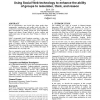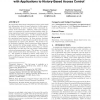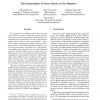754 search results - page 137 / 151 » Can self-managed systems be trusted |
SIGMOD
2009
ACM
14 years 8 months ago
2009
ACM
We are experiencing a new Social Web, where people share, communicate, commiserate, and conflict with each other. As evidenced by systems like Wikipedia, twitter, and delicious.co...
CCS
2005
ACM
14 years 1 months ago
2005
ACM
In a reputation-based trust-management system, agents maintain information about the past behaviour of other agents. This information is used to guide future trust-based decisions...
ICS
2003
Tsinghua U.
14 years 29 days ago
2003
Tsinghua U.
We describe the architecture for a single-chip aegis processor which can be used to build computing systems secure against both physical and software attacks. Our architecture ass...
FLAIRS
2007
13 years 10 months ago
2007
As personal assistant software matures and assumes more autonomous control of its users’ activities, it becomes more critical that this software can explain its task processing....
MICRO
2007
IEEE
14 years 2 months ago
2007
IEEE
The performance of computer systems varies over the course of their execution. A system may perform well during some parts of its execution and poorly during others. To understand...



